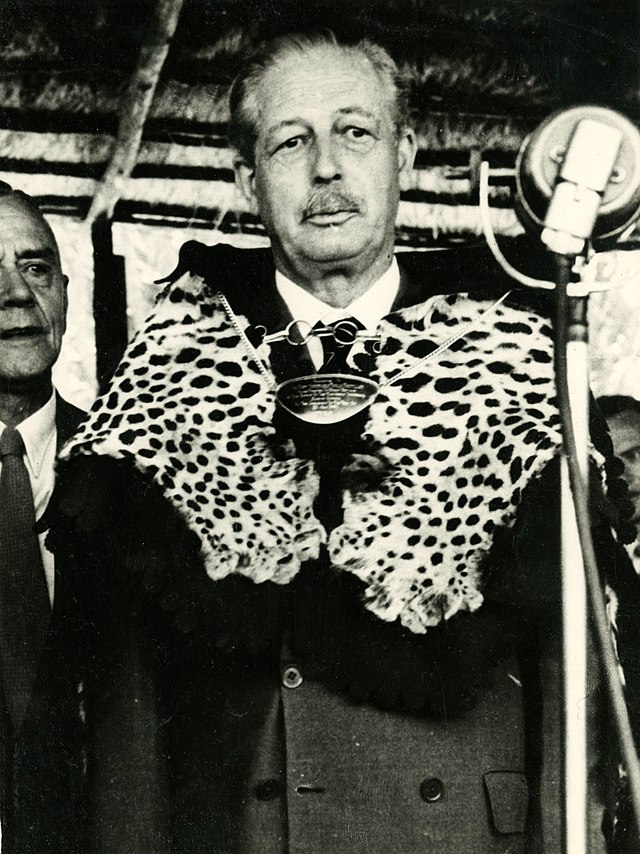.jpg)
In Dr Andrew S. Roe Crines' blog, he recontextualises decolonisation by conducting a rhetorical political analysis of Harold Macmillan’s ‘Wind of Change’ speech.
For a new open access article with the journal British Politics, I have sought to recontextualise decolonisation by conducting a rhetorical political analysis of Harold Macmillan’s ‘Wind of Change’ speech delivered to the South African Parliament in 1960. The speech was significant because it not only marked the hitherto tacit acceptance of the end of Empire by the Conservative Party leadership, but it also confronted the South African Apartheid regime with this reality. It was a message they did not want to hear, with Apartheid Prime Minister, Hendrik Verwoerd putting “an impromptu defence of his policies ‘for justice for the white man to a vote in Parliament” (Macmillan 1972: 159; Roe-Crines, 2023). Nevertheless, the reality of imperial decline had been a process well underway since the loss of India, with murmurings of decline heard in the years before then.
The speech was also a message to the Conservative Party membership and wider British population who retained affection of the Empire and felt British foreign policy remained intertwined with retaining imperial holdings, potentially tied to an expectation of future expansion. This affection was predicated on the belief that Britain could still be a global power, even on a par with the United States or the Soviet Union. However, the ages of imperialism were essentially based on European international competition, which Macmillan himself characterised as “many parts of Africa… suffered from the careless, some might even say criminal, methods by which the different portions of the newly discovered parts of Africa were divided during the grab for colonies by the rival European powers”. Thus, the impacts of the First and the Second World Wars had shifted international powerbases away from the old imperial powers, and more towards global power blocs that eschewed imperialism.
Macmillan’s arguments were also based on finding a new international role for the UK whereby Great Britain could position itself within the new global orders. Resistance to this reality whilst seeking to retain control over the Empire would be a dead-end, particularly given the growth of nationalism and demands for autonomy from formerly imperial territories. This brought about the process of decolonisation, with the UK granting independence to states where the majority ethnic group demanded such autonomy. This is what made the ‘Wind of Change’ speech so dramatic – put simply, the arena and location of the delivery.

The Apartheid regime represented a minority of non-ethnically indigenous rulers who governed a majority ethnic population. The population did not want to remain under this form of rule, yet the regime represented the system which the majority population wanted to shake off. As an arena, this is what made the delivery of the ‘Wind of Change’ speech so impactful, given it was made directly to those who were ideologically confronted by the speech. Furthermore, his secondary audiences back in the UK heard the message as a form of ‘wake-up call’ not just to imperial decline but the wider consequences for Britain and the need to find a new role.
The new role for Britain would transcend imperialism. The Union Flag would represent a new British approach to foreign policy based on membership of global institutions of international cooperation. The Commonwealth would diverge from the Empire to include members who had no prior connection to Britain, whilst some others who has been part of the Empire would find their own roles without further recourse to the UK. Without the Wind of Change speech, this transformation would not have occurred.
Today, the Empire is a thing of the past. Remaining relationships are based on cooperation and democratic mandates. The Monarch as the Head of State of former colonies is now a democratic choice, based on the wishes of indigenous populations who are free to break the link at any time of their democratic choosing. As Britain also returns to some of the essential post-Brexit questions of what its role is in the world, it can be argued that the future is based on membership of international groups such as the United Nations, the Commonwealth, and NATO, as Macmillan envisioned. Britain’s prominence in such organisations is based on unity of purposes and promotion of shared values, which help solidify Britain’s post-decolonial place in the world.
Works Cited
Macmillan, H. 1972. Pointing the Way, 1959-61, London: Macmillan.
Roe-Crines, A. 2023. ‘‘The Wind of Change’: A Rhetorical Political Analysis of Harold Macmillan’s 1960 ‘decolonization’ speech’, British Politics.